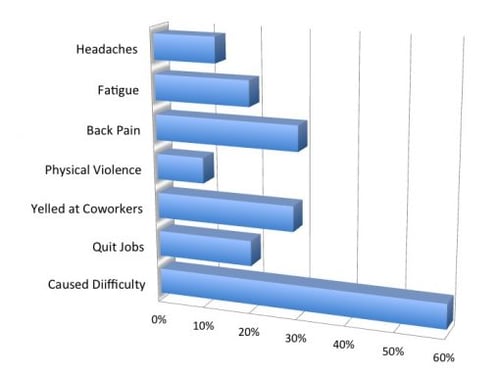Posted by Gazelle Global
Stress in the Workplace: How Not to Become a Fourth Quarter Quitter
Chances are if you’re reading this, and you’ve ever had a job, you’ve experienced stress in the workplace. In fact, numerous studies have revealed stress to be the single most detrimental health issue in the present workforce. The American Institute of Stress suggests that your actual job is irrelevant. However, the nature of what they call the person-environment fit dictates your level of perceived control, and thus, your stress level.
So, just how dangerous is that late-night cramming for a presentation?
How is the way in which you cope with the demands of an upcoming deadline affecting your health?
Or, to keep the attention of those reading from a corner office, how is it affecting your productivity?
It seems everyone is talking about ways to reduce stress. From the high-powered executives positing that stress is simply an inevitability of corporate America to be used as a motivator, to your yoga teacher, repeating mantras of mindfulness as she manhandles you into the proper placement of downward-facing dog. Here’s what we know: you’re going to be stressed at work. What you do with that fact is up to you, but in the absence of a worldwide mid-day happy hour, here is some pertinent information that just might help.
One might think that particular jobs cause more stress than others. Objectively, this is reasonable. A police officer or a pediatric surgeon surely faces more stress than your mailman, right? Not necessarily. The American Institute of Stress (AIS) is often asked to rate jobs according to stress and consistently rejects such requests. According the Institute, these rankings are irrelevant as stress is a highly subjective and personalized plight. Several factors contribute to feeling stress:
1. Personality
Simply put, different things will cause stress in different people. Perhaps you perform well under pressure. Provided you feel you are in control, juggling 2 or 3 projects at once is where you thrive. Or, conceivably, you are the exact opposite.It has allowed us to reach or surpass critical mass connectivity across the globe
2. Environment
Whether you get along with fellow employees, feel respected and appreciated in the workplace; your level of social comfort.
3. Low Job Security
Are you constantly worried about your longevity in your given position?
4. The Magnitude of the Demands Being Made
From the more obvious end of the spectrum, that you are simply being overworked or overexerting yourself to meet demands…to the more nuanced factors. An internal client can be demanding. Or, you’re being asked to engage with subject matter that does not align with your personal beliefs, for instance.
5. The Employee’s Perceived Control Over a Situation
Not to be confused with actual level of control over a situation. Feeling like one is in control alleviates stress.
6. Role Ambiguity
Is it clear to you what falls under your responsibility and what does not?
7. The Employee's Decision-Making Liberty and Access to Resources/Assistance
What are you able to do? Do you have people available to you that can help? Is it within your authorization to make decisions that affect real change in any given situation?
The CDC approximates that about one-third of workers report high levels of stress at work. It’s safe to say Americans are working harder, and that profitable productivity is taking a toll. So, what can you do? And, more importantly (if we’ve maintained the attention of our aforementioned, corner office productivity police), how much does stress really matter?
First, how much of an effect is stress really having? In short, a lot. A 2000 Integra survey reported that 65% of workers said workplace stress had caused difficulties, 10% of which claiming these difficulties had major effects. 10% claimed to work in a place where physical violence has occurred because of job stress. 29% had yelled at coworkers. Almost 20% admitting to having quit previous jobs due to stress. A study by the European Commission found that 30% of workers suffered from back pain, 20% felt fatigued, 13% reported headaches. A 2013 Towers Watson survey identified stress as the number one workforce health issue, above both physical inactivity and obesity. The CDC suggests that the research points to stress as the major cause of turnover in organizations.

Moreover, job stress is costly. The AIS posits that job stress costs the U.S industry over $300 billion annually as a result of accidents, absenteeism, employee turnover, diminished productivity, worker’s comp, and medical, legal and insurance costs. In case you’re averse to statistics and scary facts, or an unflappable skeptic, let’s put it in plain English:
Stress is a big deal.
As the irony of showering our readers with stressful facts about stress does not escape me, fear not! There are things you can do. The National Institute for Occupational Safety and Health (NIOSH) propose that there are two main ways of intervening on stress. The first is reactive. Provide coping tools to employees who are currently experiencing stress. From a managerial perspective, for example, this can be executed by providing a time and space for employees to discuss any issues.
From the perspective of the employee:
- Be mindful of what stresses you in particular
- Be self-aware and assertive about your needs, to the extent that you can
- Do things that alleviate stress for you when you are outside of work
- Manage your time in a manner that suits you best
The second approach is more preventative, less tertiary, and physicians suggest could have a larger effect on public health. Address the root causes of job stress. Create, to the extent that you are able, an environment that fosters positive attitudes and motivated productivity. Furthermore, and applicable to every position, make wise choices about with whom you do business. Do all that you can to align yourself with supportive, responsible, reasonable colleagues, clients, and business acquaintances. Represent and market your company in a way that reflects these goals. A combination of these organizational changes and individual stress management is a recipe for success. Deep breath. We’re in this together.



